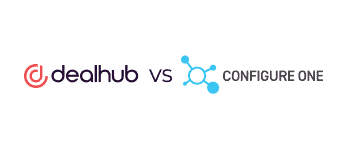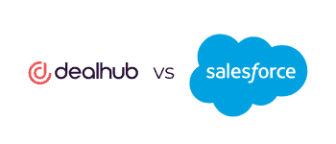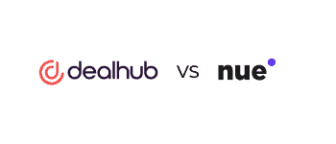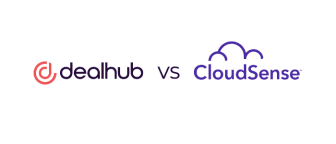Introduction
Compare DealHub CPQ vs. Configure One CPQ
DealHub and Configure One are both robust Configure, Price, Quote (CPQ) solutions designed to streamline sales processes by automating product configuration, pricing, and quoting. Both platforms offer seamless integration with existing systems, enhancing operational efficiency and reducing pricing and configuration errors.
However, their core strengths cater to different business needs. DealHub CPQ excels in providing guided selling features and dynamic quote generation, enabling sales teams to swiftly create accurate, professional quotes, even for complex deals. Its intuitive interface and real-time engagement insights empower teams to close deals faster and drive business growth.
Configure One CPQ is tailored for manufacturers dealing with complex, configurable products. It offers advanced visualization capabilities, including 2D and 3D imaging, allowing users to visualize product configurations effectively. Additionally, Configure One provides CAD automation and ERP system integration, making it particularly beneficial for manufacturing environments.
Product Overview
Overview of each CPQ Solution
DealHub and Configure One approach the CPQ function quite differently. DealHub helps sales-heavy companies scale efficiently and optimize their revenue cycles. Configure One is purpose-built for manufacturers, including powerful tools specifically designed to manage quotes, high-volume orders, and the documents involved in those processes.
Defining DealHub CPQ
DealHub is a quote-to-revenue platform that enables companies to increase efficiency and grow sales revenue. It offers CPQ, CLM, and DealRoom software, billing and subscription management. With DealHub, you can create complex quotes quickly and accurately, present quotes and supporting content in a customized digital sales room, and connect quoting and billing for a seamless customer experience.
DealHub automates time-consuming tasks for sales reps and provides them with a toolkit for closing deals. Its no-code environment allows sales and RevOps teams to adapt quickly to changes in business needs—such as pricing and product updates—in real-time.
The platform promotes revenue growth by allowing RevOps teams to manage discounts and dynamic pricing while controlling multiple quote versions for customers. Advanced approval workflows make it easier to quickly implement changes based on sales and projected revenue. Seamless integrations and APIs sync data across systems.
Beyond its core features and added benefits of subscription and billing management, its separate product—DealRoom—works hand-in-hand with DealHub CPQ. It unifies all sales collaboration, keeping multiple sellers and company decision-makers in one digital location for immediate document sharing, approvals, and communication.
Although DealHub serves multiple customer segments, these features (along with its scalability and no-code customizability) make it ideal for mid-sized to enterprise SaaS companies, many of which use recurring revenue models and microservice product architecture DealHub’s product effortlessly manages.
Defining Configure One CPQ
At the heart of Configure One is its standout product configurator, which has both 2D and 3D visualization capabilities. Customers can interact with this web-based configurator to select product features according to their requirements. This results in more precise cost estimates, valid product configurations, and time savings for the purchaser and vendor.
CAD automation is another standout feature. Using Configure One CPQ, manufacturers can automatically create production drawings, BOMs (Bill of Materials), and routings based on selected product configurations. When CPQ and CAD operate in parallel, it streamlines the manufacturing process, reduces manual effort and errors, and accelerates time to market.
Configure One has a powerful GraphQL API and custom coding options for enterprise manufacturers and those with complex product models (made up of hundreds of parts). CRM and ERP system integration makes it a flexible solution that enables a unified data flow across different systems, improving visibility across the entire sales and manufacturing process.
Product Features
Comparison of Key Features
DealHub and Configure One serve different customer segments, so the platforms have specific features tailored to their respective customers.
DealHub stands out with its DealRoom feature, a collaborative platform that brings all deal-related activities into a single workspace for more efficient decision-making and faster sales cycles. The Deal Stream and Deal Talk features bring communication and notifications into the proposal interface, simplifying stakeholder collaboration. It also excels in subscription management, offering tools for automated billing, contract renewals, and customer retention, making it ideal for businesses with subscription-based pricing models.
DealHub recently upgraded its user interface and search capabilities. It features a consolidated, customizable workspace with a clean layout, making it easier to access and organize opportunities and proposals from a single view. Advanced filtering capabilities help users quickly surface critical deals, such as upcoming renewals or proposals needing attention, using customizable, shareable filters with visual cues for easy recognition.
Configure One shines in complex configuration of physical products. Its interactive web configurator eliminates one of the biggest challenges for B2B manufacturers: helping customers understand what the product looks like in real life. Omnichannel order management in Configure One CPQ seamlessly integrates with other systems to create a unified order management process.
Here’s a breakdown of each product’s features:
| DealHub CPQ | Configure One CPQ |
|---|---|
| A unified quote-to-revenue platform, including CPQ, CLM, DealRoom, e-signature, invoicing, subscription management, and sales engagement insights. | Specialized CPQ designed for manufacturers and distributors, focusing on product configuration, quote creation, and order management. |
| Integration with third-party software, including Salesforce, Freshworks CRM, Microsoft Dynamics 365, HubSpot, accounting software, DocuSign, and ERP systems. API integrations sync pricing and other data into the playbook and enable advanced user management. | Facilitates integration with various CRM and ERP systems, enabling seamless data exchange and improved efficiency. |
| Quick and easy no-code setup process, enabling your team to be up and running within weeks. Customizable Proposal and DealRoom layouts align with the way you work. | Offers specialized support for larger teams, including extensive training and implementation assistance. |
| Guided selling and advanced filtering empower sales reps to create winning proposals quickly and easily through an intuitive quoting process synced to your CRM. | Powerful product configurator that allows sales reps to create detailed and accurate quotes for complex products. |
| Designed with scalability in mind, readily accommodating growth and expansion of sales teams. | Capable of handling large-scale, complex product configurations, making it scalable for growing businesses. |
| With DealRoom, digital proposals can be easily sent via one URL, allowing companies to provide their customers with one point of interaction throughout all deal stages rather than multiple files or links. | Employs 3D product visualizations and omnichannel order management to enhance the buying experience. |
| Out-of-the-box contract management, document generation, e-signature, and multi-dimensional pricing models. | Offers a comprehensive suite of tools for managing product configurations, pricing models, and documentation. |
| Predictive sales playbooks accelerate the sales process by guiding sales reps. | Uses advanced configuration rules to guide sales reps through the product configuration process, speeding up the sales process. |
| Comprehensive subscription, renewal, and order management capabilities with rules-based quoting for complex sales. | Adapt customer-specific sales discounts and prices with subscription features. |
| Offers buyer engagement insights to equip sales reps with actionable data for refining future sales engagements. | Provides detailed configuration data, aiding sales reps in refining their approach for future sales engagements. |
| Automated approval workflows ensure defined user roles and faster sales cycles. Deal Stream enables deal-specific buyer engagement insights while Deal Talk enables real-time, deal-specific messaging directly within proposals. | Provides detailed configuration data, aiding sales reps in refining their approach for future sales engagements. |
| Cross-functional collaboration during the quoting process, complete with audit trails for accountability and transparency. | Utilizes automation in order management and production data integration to streamline the sales funnel. |
| Supports multi-currency price quotes with localized pricing for international companies. | Supports multi-currency quoting and BOM pricing. |
| Web-based platform. | Web-based platform. |
| Implementation team Phone support Mobile and online customer support Knowledge base DealHub Academy | Online support Customer help portal Enterprise support portal |
Customer Size
Ideal Customer Profiles
DealHub and Configure One CPQ cater to distinct customer profiles based on their core functionalities and industry focus.
DealHub is ideal for high-growth SaaS, technology, and manufacturing companies that need a streamlined, no-code CPQ solution to accelerate their sales cycles. Its strengths lie in guided selling, real-time collaboration, and seamless CRM integrations, making it a perfect fit for sales teams that prioritize speed, accuracy, and automation. DealHub supports manufacturers that do not require visual configuration or CAD integration but still need efficient quote generation and approval workflows.
Configure One, on the other hand, is tailored for manufacturers dealing with highly configurable, engineer-to-order products that require advanced visualization and CAD integration. Its ideal customers include industrial equipment manufacturers, custom machinery producers, and other businesses that need robust product configuration capabilities. Configure One’s deep integration with ERP systems and support for 2D and 3D visualization make it especially useful for companies that rely on detailed technical specifications to generate accurate quotes and manufacturing instructions.
While both CPQ solutions help companies streamline their sales process, their target customers differ in terms of complexity and industry requirements. DealHub is best suited for organizations looking for a user-friendly, flexible product configurator that enhances sales efficiency without the need for complex engineering integrations. Configure One is designed for manufacturers that require intricate product customization, CAD automation, and visual configuration to support their quoting and production processes.
Businesses selecting a CPQ solution should consider their unique requirements and whether their needs align more with a dynamic, sales-driven quoting experience or a configuration-heavy manufacturing environment.
Customer Support
Support Features & Resources for Each Solution
Customer support is especially important for CPQ software—implementation requires resources to ensure company wide adoption and ongoing support is a requirement for long-term success. Both DealHub and Configure One provide dedicated customer support teams to help with implementation, training, and ongoing technical assistance.
DealHub provides comprehensive customer support, starting from the onboarding process. An in-house team of experts ensures proper product setup and educates reps and managers on using the software effectively. This hands-on approach, coupled with ongoing support, fosters quick software adoption and reduces the likelihood of post-implementation issues.
Configure One offers robust support tailored to the needs of larger organizations through its dedicated enterprise arm. For all other customers, its customer portal serves as a hub for users to access various resources, including FAQs, tutorials, and direct communication with the support team, ensuring businesses have the resources needed to effectively use the software and troubleshoot issues.
Pricing
Breakdown of Pricing Options
Pricing plays a critical role in any CPQ software decision. DealHub and Configure One both offer pricing plans that aim to increase efficiency, reduce complexity, and deliver value for their customers. Both companies use the subscription business model and use quote-based pricing that requires a conversation with the sales team.
On the low end, DealHub’s software starts at $50 per month. There are no pricing tiers—all product features are included with every software license. The price increases with each additional sales rep added to the subscription.
Configure One’s pricing is similar—its base-level pricing is $150. Like DealHub, it offers all features in each plan, and its pricing is primarily scaled based on the number of users.
Here’s a quick rundown of the costs associated with each product:
| DealHub CPQ | Configure One CPQ | |
|---|---|---|
| Product Pricing | Contact sales | Contact sales |
| Implementation Fees | One-time implementation fee | One-time implementation fee |
| Additional Licenses | No additional license fees | No additional license fees |
Summary
Considerations for Choosing Between the Two Solutions
When evaluating DealHub and Configure One CPQ, consider the complexity of your sales process and the level of customization your products require. DealHub is ideal for companies that need a fast, user-friendly CPQ to streamline quoting, approvals, and deal management. Its no-code setup and automation features make it a great choice for businesses looking to improve sales efficiency without technical complexity.
Configure One, in contrast, is built for manufacturers that require in-depth product configuration and engineering integration. Its advanced visualization tools, CAD automation, and ERP connectivity make it well-suited for businesses that sell highly customized or engineer-to-order products. Companies that rely on detailed technical specifications to generate accurate quotes will benefit from its robust configuration engine.
Choosing the right CPQ solution comes down to your industry needs and workflow requirements. If you need a flexible, sales-driven CPQ without the need for CAD or visual configuration, DealHub is the better option. However, if your quoting process depends on engineering data and complex product customization, Configure One offers the necessary technical capabilities to support your business.
FAQs
Frequently Asked Questions
A good CPQ solution should streamline the sales process by automating product configuration, pricing, and quote generation while minimizing errors and inefficiencies. It should be intuitive and easy to use, allowing sales teams to quickly generate accurate quotes without extensive technical expertise. Seamless integration with CRM, ERP, and other business systems is also essential to ensure a smooth flow of data and improve overall sales operations.
Additionally, a strong CPQ should offer flexibility to accommodate different pricing models, approval workflows, and levels of product complexity. Advanced features like guided selling, AI-powered recommendations, and real-time collaboration can further enhance the quoting process, helping sales teams close deals faster. For manufacturers, robust configuration capabilities, CAD integration, channel sales capabilities, and BOM generation may be crucial, while SaaS and technology companies may prioritize subscription and usage-based pricing support.
Conga CPQ (formerly Apttus), which is built on the Salesforce platform, is the most well-known CPQ software. But the choice of CPQ software can depend heavily on specific business needs. There are niche CPQ solutions like DealHub, which is popular for SaaS companies, and Configure One, which is tailored for manufacturers. Agencies and HR companies often rely on PandaDoc, which is known for its document automation capabilities.
The configure stage is where customers select the features, options, and accessories they want in a product or service. This is often done through an interactive interface that allows customers to customize their orders according to their needs—such as size, color, and product pricing. The CPQ software then calculates the total cost of the order based on all these customer-selected elements.
Product variations are necessary for CPQ platforms to provide customers with accurate pricing information. They also ensure that customers can purchase the exact product they need—whether it’s a customized solution or a standard one. Product variations streamline the sales process by making sure that customers get exactly what they’re looking for, quickly and efficiently.
DealHub integrates seamlessly with Salesforce. Salesforce customers can work deals in DealHub’s interface and reflect their data in each customer profile on Salesforce. It also provides insight into pipeline health and close rates, so you can better understand how your sales team performs at each stage of the cycle.
Configure One integrates natively with Salesforce and is available on the AppExchange. This integration helps streamline operations and provides sales teams with a comprehensive view of customer data, including pricing information and product configurations. It also allows for automatic updates to be made to the Salesforce system whenever prices or features change.
The biggest limitation of CPQ in Salesforce is the lack of integration with other Salesforce products. This isn’t a huge issue if a company only relies on its CRM, but it could be problematic for organizations running entirely on Salesforce.
Another issue is the difference in UI. Constantly switching between Salesforce and CPQ can be jarring, so some users opt for a natively integrated product or Salesforce’s own CPQ, rather than a custom-coded integration.

Rhonda Bavaro excels in boosting SaaS companies’ growth through innovative content marketing, thriving in the dynamic sales tech industry amidst evolving technologies that drive revenue acceleration.








